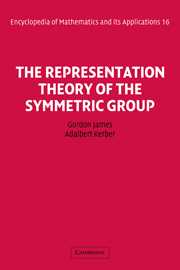Book contents
- Frontmatter
- Contents
- Editor's Statement
- Section Editor's Foreword
- Introduction by G. de B. Robinson
- Preface
- List of Symbols
- The Representation Theory of the Symmetric Group
- Chapter 1 Symmetric Groups and Their Young Subgroups
- Chapter 2 Ordinary Irreducible Representations and Characters of Symmetric and Alternating Groups
- Chapter 3 Ordinary Irreducible Matrix Representations of Symmetric Groups
- Chapter 4 Representations of Wreath Products
- Chapter 5 Applications to Combinatorics and Representation Theory
- Chapter 6 Modular Representations
- Chapter 7 Representation Theory of Sn over an Arbitrary Field
- Chapter 8 Representations of General Linear Groups
- Appendix I Tables
- Appendix II Notes and References
- Index
Chapter 6 - Modular Representations
Published online by Cambridge University Press: 05 December 2015
- Frontmatter
- Contents
- Editor's Statement
- Section Editor's Foreword
- Introduction by G. de B. Robinson
- Preface
- List of Symbols
- The Representation Theory of the Symmetric Group
- Chapter 1 Symmetric Groups and Their Young Subgroups
- Chapter 2 Ordinary Irreducible Representations and Characters of Symmetric and Alternating Groups
- Chapter 3 Ordinary Irreducible Matrix Representations of Symmetric Groups
- Chapter 4 Representations of Wreath Products
- Chapter 5 Applications to Combinatorics and Representation Theory
- Chapter 6 Modular Representations
- Chapter 7 Representation Theory of Sn over an Arbitrary Field
- Chapter 8 Representations of General Linear Groups
- Appendix I Tables
- Appendix II Notes and References
- Index
Summary
We turn now to the modular representation theory of symmetric groups; that is, we shall work over fields whose characteristic is a prime number p. There are two distinct ways of approaching the modular theory, either by working in terms of the characters or by way of a module-theoretic definition of the modular irreducibles. In this chapter we concentrate on the former, more classical approach. Here, the emphasis is on the p-block structure, and the central theorem, which is still called “Nakayama's conjecture” although it has long since been proved, provides a necessary and sufficient condition for two ordinary irreducible characters to lie in the same p-block. It is one of the most beautiful results in the entire theory of symmetric groups.
After presenting the theory of p-blocks, we shall look closely at the as yet unsolved problem of determining the decomposition matrices of Sn. It becomes clear in the end that some more powerful techniques are required, and we shall turn in the next chapter to one of the alternative ways of conducting an investigation of modular representations.
The p-block Structure of the Ordinary Irreducibles of Sn and An; Generalized Decomposition Numbers
Recall from 2.1.12 that every field is a splitting field for Sn and hence, in particular, ℤp, the field of p elements, is a splitting field. We may therefore restrict our attention to representations of Sn over ℤp, and call these the p-modular representations of Sn.
Information
- Type
- Chapter
- Information
- The Representation Theory of the Symmetric Group , pp. 240 - 293Publisher: Cambridge University PressPrint publication year: 1984
